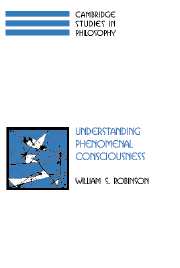12 - PATTERNS AS CAUSES OF QUALITATIVE EVENTS
Published online by Cambridge University Press: 22 July 2009
Summary
In this chapter I introduce patterns of neural activity as causes of conscious events. I approach patterns from two directions, once through a thought experiment and once again through the property of homogeneity. The focus in this chapter is to clarify what it is to regard pattern – pattern as such – as fundamental to consciousness. Some questions and objections that may be raised regarding the resulting view will be addressed in the following chapter.
A preliminary caveat will save tedious qualifications later and also provide a helpful first step in focusing on the importance of pattern as such. In the thought experiment to follow, I shall assume that the brain events that are at least correlatable with conscious events are neural events. This assumption is both familiar and plausible. It is, however, conceivable that the patterns that are relevant to the occurrence of conscious events are patterns of activity in microtubules, or patterns of activity in glial cells, or patterns of activity in some combination of microtubules, glial cells, and neurons. If any of these possibilities turns out to be actual, the wording of the following discussion would have to be significantly revised. However, since the emphasis is on patterns, in abstraction from the kinds of elements in which patterns may be realized, the main conclusions would remain exactly the same as the ones that will be drawn from the discussion conducted in terms of neurons.
- Type
- Chapter
- Information
- Understanding Phenomenal Consciousness , pp. 207 - 226Publisher: Cambridge University PressPrint publication year: 2004



